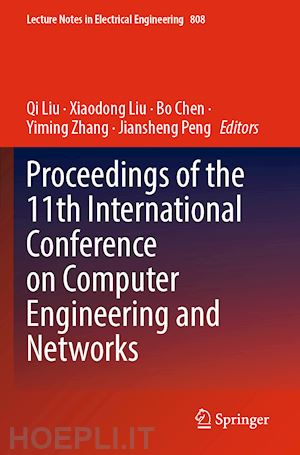
Questo prodotto usufruisce delle SPEDIZIONI GRATIS
selezionando l'opzione Corriere Veloce in fase di ordine.
Pagabile anche con Carta della cultura giovani e del merito, 18App Bonus Cultura e Carta del Docente
Qi Liu received the B.S. degree in Computer Science and Technology from Zhuzhou Institute of Technology, China in 2003, and M.S. and Ph.D. in Data Telecommunications and Networks from the University of Salford, the UK in 2006 and 2010. His research interests include context awareness, data communication in MANET and WSN, and smart grid. His recent research work focuses on intelligent agriculture and meteorological observation systems based on WSN.
Prof X. Liu received his PhD in Computer Science from De Montfort University and joined Napier in 1999. He is currently leading the Software Systems research group in the SoC, Edinburgh Napier University. He was the director of Centre for Information & Software Systems. Prof Liu is an active researcher in software engineering with internationally excellent reputation and leading expertise, focusing on its emerging themes including pervasive systems (Internet of Things), services-oriented architecture, evolutionof cloud services, and intelligence-driven software engineering. He has meanwhile a successful track record of teaching in a number of software engineering courses which are widely informed by his research activities. He has led 10 externally funded projects as the PI, and published over 120 papers in established international journals and conferences, 5 book chapters and 3 research handbooks. He is the inventor of 1 patent registered in UK and USA and the founder of a spin-out company. He has been the chair, co-chair or PC member of a number of IEEE and IASTED International Conferences. He is the editorial board member of 4 international journals and editor of 3 research books and 2 journals special issues. He is a senior member of IEEE Society and a member of British Computer Society.
Bo Chen received the B.S., M.S., and Ph.D. degrees from Xidian University, Xi’an, China, in 2003, 2006, and 2008, respectively, all in electronic engineering. He became a Postdoctoral Fellow, a Research Scientist, and a Senior Research Scientist with the Department of Electrical and Computer Engineering, Duke University, Durham, NC, USA, from 2008 to 2012. From 2013, he has been a Professor with National Laboratory for Radar Signal Processing, Xidian University. His current research interests include statistical machine learning, statistical signal processing, and radar automatic target detection and recognition.
Zhang Yiming is the director of advanced computing method application research center of Hebei University of technology. In 2006 and 2009, he obtained a bachelor's degree and a master's degree in civil engineering from Tongji University. In 2009, he went to TUWien University of science and Technology (TUWien) School of structural and material engineering to study for a doctor's degree. His doctoral tutors are Engineering Academies and scientific academies of 20 countries / regions, including American Academy of Engineering, German Academy of Engineering andChinese Academy of Engineering (foreign) member Herbert MANG. He received his doctorate in 2013 with excellent results (German standard). From 2013 to 2017, he was a researcher at the University of Innsbruck in Austria and Leibniz University in Hanover, Germany. It has participated in three KIRAS sub projects of Austrian National Security Project (total amount of 1.45 million euro) and one project of Austrian National Science Fund (total amount of 350,000 Euro).
Up to now, nine SCI papers have been published by the first author with an average impact factor of 2.6. The paper "strong discontinuity embedded approach with standard SOS formula" published in CMAME in 2015 solved the stress locking problem caused by static symmetric mode of embedded discontinuous element method, which has puzzled the academic community for more than 25 years. In 2017, the paper "multi slicing strategy" was published in IJNAMG For the three-dimensional discontinuity layout optimization (3D DLO) "is oneof the only two papers published in the world by the end of 2017, and the paper" cracking elements: a self-propagating strong discontinuity embedded approach for quasi brittle "was published in FINEL in 2018 Fracture "proposed a kind of efficient calculation model of crack self propagation and self initiation.
Peng Jiansheng graduated from China Institute of atomic energy in July 2013. He is now working in Hechi University, Yizhou, China. His main research fields include multi robot cooperation, embedded system design and development, intelligent system control, etc.
He presided over two projects of National Natural Science Foundation and two projects of Provincial Natural Science Foundation. He won the first prize of science and technology progress award of China Communication Industry Association. More than 60 papers have been published by the first author or corresponding author, including 17 papers by EI and SCI, 1 monograph, 13 invention patents authorized andmore











Il sito utilizza cookie ed altri strumenti di tracciamento che raccolgono informazioni dal dispositivo dell’utente. Oltre ai cookie tecnici ed analitici aggregati, strettamente necessari per il funzionamento di questo sito web, previo consenso dell’utente possono essere installati cookie di profilazione e marketing e cookie dei social media. Cliccando su “Accetto tutti i cookie” saranno attivate tutte le categorie di cookie. Per accettare solo deterninate categorie di cookie, cliccare invece su “Impostazioni cookie”. Chiudendo il banner o continuando a navigare saranno installati solo cookie tecnici. Per maggiori dettagli, consultare la Cookie Policy.